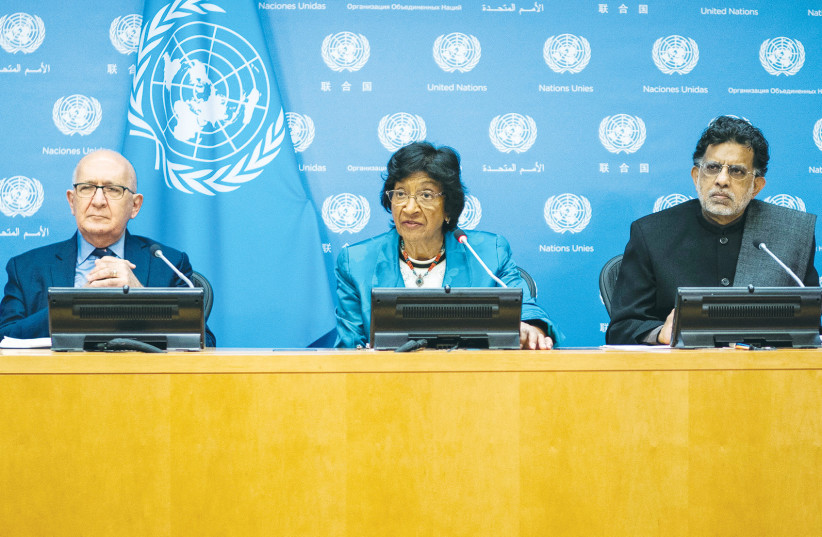A United Nations committee is set to hold a vote this week on bringing the question of the legality of Israel’s “occupation” of lands beyond pre-1967 lines to the International Court of Justice (ICJ) at The Hague.
Palestinian representatives to the UN pushed the resolution, which was officially proposed by Nicaragua since the Palestinians are observers, not a member state. It asks the ICJ to consider that the continuing nature of the “Israeli occupation” is de facto annexation.
The UN Social, Humanitarian and Cultural Affairs Committee, known as the Third Committee, is set to begin debating the matter on Wednesday and to vote on Friday. If the committee approves the measure, which it is likely to do, the UN General Assembly will vote on it next month. If that is approved, which is also likely, the question will be brought before the ICJ.
An ICJ decision that Israel has illegally annexed the West Bank and east Jerusalem would not be legally binding on the Jewish state, but Jerusalem would view such a decision as a serious blow that would empower the movement to delegitimize Israel and pressure international corporations to boycott it, a diplomatic source said.
“The Palestinian proposal is part of an anti-Israel campaign infected with antisemitism that is meant to damage Israel’s legitimacy and its right to self-defense.”
Israeli Ambassador to the UN Gilad Erdan
Diplomatic counter-efforts
US Secretary of State Antony Blinken discussed the matter with Palestinian Authority President Mahmoud Abbas in their phone call on Friday, discouraging him from pursuing the ICJ route, but to no avail, the diplomatic source said.

Meanwhile, Israeli Ambassador to the UN Gilad Erdan has been speaking and meeting with representatives of democratic countries to encourage them to vote against the resolution.
“The Palestinian proposal is part of an anti-Israel campaign infected with antisemitism that is meant to damage Israel’s legitimacy and its right to self-defense,” he said.
“Abbas is once again acting destructively in a way that will only hurt the Palestinians themselves,” Erdan said. “We will make clear to every country that supporting this initiative is a prize to terrorist organizations and will only perpetuate the conflict.”
Abbas has long threatened to make this move. In his 2021 speech to the General Assembly, he called on the UN “to take the necessary steps towards developing an international mechanism for protection… on the borders of the occupied State of Palestine in 1967, including east Jerusalem.
“To ensure our initiative is not open-ended, we must state that Israel, the occupying power, has one year to withdraw from the Palestinian territory it occupied in 1967,” Abbas said.
When Israel won the Six Day War in 1967, a defensive war, the West Bank and east Jerusalem were controlled by Jordan. Although UN Security Council Resolution 242 passed soon after the war, calls for a “just and lasting peace” involving Israeli withdrawal from those areas, as well as the Gaza Strip and the Golan Heights, it does not say that Israel is occupying the “State of Palestine,” as Abbas claims, because one has never existed.
Navi Pillay and the UN Commission of Inquiry
Last month, the UN Commission of Inquiry on “the Occupied Palestinian Territory, including East Jerusalem, and in Israel,” led by South African legal expert Navi Pillay, submitted a similar request along with its second report to the Third Committee.
“The actions of Israeli governments reviewed in our report constitute an illegal occupation and annexation regime that must be addressed,” COI commissioner Chris Sidoti said.
“The international system and individual states must act and uphold their obligations under international law,” he said. “That must begin at this session of the General Assembly with a referral to the International Court of Justice.”
All three of the commission’s commissioners have a history of anti-Israel activism. Miloon Kothari was widely denounced for antisemitism by several UN member states and senior UN officials, including UN Secretary-General Antonio Gutteres, after claiming that “social media... is controlled largely by [Jews] – whether it is the Jewish lobby or specific NGOs.”
The ICJ, which is located at The Hague, has so far issued only one advisory opinion on Israel. In 2004, it declared that the sections of Israel’s security barrier that were constructed over the pre-1967 lines were illegal.
Tovah Lazaroff contributed to this report.
